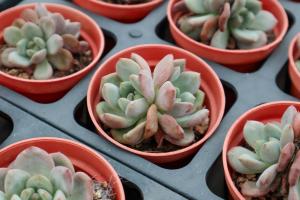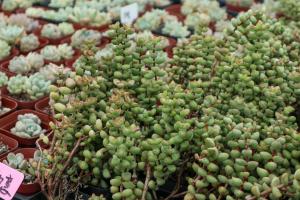How to care for zucchini plants in pots
Zucchini is a popular squash plant and can be grown easily in pots. Many people prefer to grow zucchini in pots as it requires less space and can be grown year-round. However, growing zucchini plants in pots require some care and maintenance to ensure healthy growth and a good harvest. Below are some tips on how to care for zucchini plants in pots.
1. Choosing the right pot
When choosing a pot for your zucchini plant, make sure it is at least 20 inches deep and 24 inches wide. This will allow enough room for the roots to grow and prevent the plant from becoming root-bound. Choose a pot made of a material that is porous, such as terracotta or clay, as it will help to maintain proper drainage and prevent water-logged soil. Be sure to choose a pot with drainage holes at the bottom.
2. Soil and fertilizers
Use a good-quality potting soil or make your own by mixing equal parts of peat moss, vermiculite, and perlite. This will ensure good drainage and aeration of the soil. Zucchini plants require frequent feeding, so use a slow-release fertilizer or liquid fertilizer every two weeks. Alternatively, you can also use compost or well-rotted manure to add nutrients to the soil.
3. Watering
Zucchini plants require plenty of water but do not like waterlogged soil. Water the plant when the soil is dry to the touch, but make sure the excess water is drained out of the pot. Avoid watering the leaves or flowers, as this can cause powdery mildew to develop. A good rule of thumb is to water your zucchini plant deeply once or twice a week, depending on the weather conditions.
4. Temperature and sunlight
Zucchini plants thrive in warm weather and prefer full sunlight. Place your pot in an area that receives at least six hours of direct sunlight daily. On hot days, move your pot to a shaded area to prevent the leaves from scorching. Zucchini plants are sensitive to cold temperatures, so be sure to protect them from frost or place them indoors during the winter months.
5. Pruning and pest control
Zucchini plants are heavy producers and require regular pruning to promote healthy growth and prevent overcrowding. Prune the excess leaves and branches, but ensure that you do not damage the main stem or fruit-bearing branches. Zucchini plants are also prone to pests such as aphids and squash vine borers. Regularly check your plant for signs of infestation and treat with insecticidal soap or neem oil to prevent further damage.
By following these tips on how to care for zucchini plants in pots, you can ensure healthy growth and a bountiful harvest of this delicious vegetable. With a little care and attention, you can enjoy fresh zucchini all year round!

 how many times do yo...
how many times do yo... how many planted tre...
how many planted tre... how many pine trees ...
how many pine trees ... how many pecan trees...
how many pecan trees... how many plants comp...
how many plants comp... how many plants can ...
how many plants can ... how many plants and ...
how many plants and ... how many pepper plan...
how many pepper plan...































